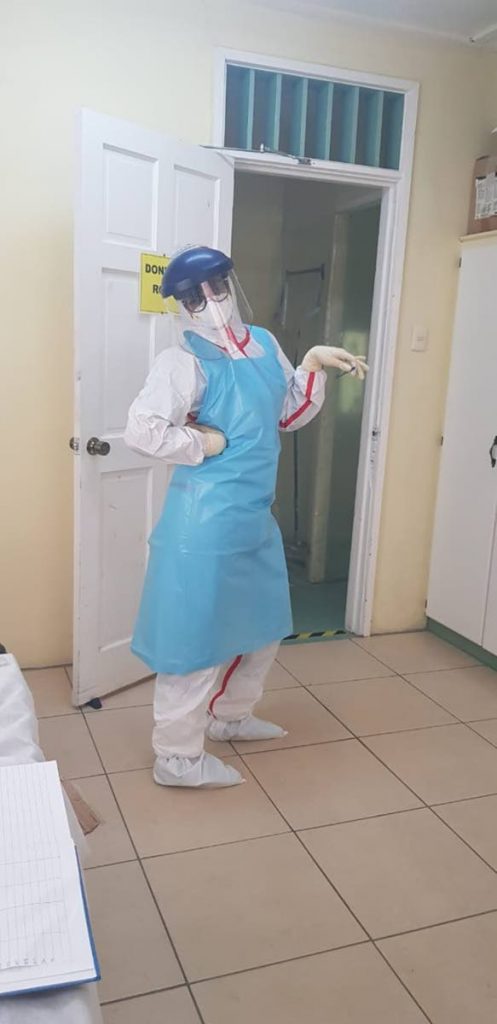Life as a covid19 nurse in Trinidad

Keisha Prevatt-Gomez works at the Couva and Caura hospital quarantine facilities.
“I feel as though we are standing at the gates and literally protecting the country," she says. "I feel a sense of purpose and responsibility towards the rest of TT. I’m making my own sacrifices because of how important it is.”
She is an infection, prevention and control (IPC) nurse with the North Central Regional Health Authority.
Prevatt-Gomez’s main role is to ensure that all staff dealing with covid19 patients are wearing their personal protective equipment (PPE) properly. She makes sure the healthcare workers have on the right gear, with no cracks or tears in the equipment, before they go into the area.
She said some people want to wear two or three masks because they think that offers them more protection, but that is not ideal.
“There are two levels of PPE we wear, depending on what we are going to do with the patient.
"If we’re going into the ICU units, we wear the Tyvek whole bodysuit with a hood and foot pieces, with an apron over it, double gloves, which are taped up, an N95 mask, and goggles or face shields.
"We wear this because these patients are more critical. If we have to suction a patient, we would be aerosolising the droplets and they might land on us, so we wear the highest level of PPE we have.
"If we have to do something less invasive, we would still wear two pairs of gloves, two shoe covers or booties, a reinforced surgical gown with an apron, a surgical face mask, goggles and a hair cover. We also give the more well patients a surgical face mask daily.”
Prevatt-Gomez said workers don PPE at least three times a shift, and there are two to three shifts in a 24-hour period. She takes stock of the PPE inventory two to three times daily, makes replenishment orders and distributes the items to the different departments. Her sister works in a hospital in New York and she said nurses in TT are much better equipped.

a pose -
Prevatt-Gomez said she thinks TT has enough PPE once there isn’t a spike in cases. There was a surplus supply because stocks were purchased in 2016 and 2017 to prepare against a possible Ebola outbreak, and the NCRHA had verified that they were still usable. She said training had been ongoing in case of a viral outbreak, so the nurses were used to working with the PPE, which is a grade above what is needed for covid19.
As a regular nurse, she works shifts with patients, taking their vitals, bringing them meals and sanitising their rooms.
Nurses, she said, also chat with the patients, many of whom are depressed and missing their families. Some are frustrated because they had to stay in bed most of the day since they were in a hospital environment. Some are in a ward where they can speak to each other, but others are in an isolation room by themselves. She said they get bored even though they have their phones and an internet connection, so the nurses will try to keep their spirits up by chatting with them over the intercom.
“One of the battles we’re having is to convince the patients that while you may feel well, you’re still contagious.
"The virus is a new thing, and I think it’s tougher on the people who aren’t very ill, because they get worse symptoms when they have the flu – why can’t they go home?
"Quarantine takes a toll on you mentally: not just the patients but staff as well.
"There’s a hotline for staff and patients to talk to psychologists and get that mental support.”
Prevatt-Gomez said the team of healthcare workers is inspired to keep doing what they do because they’ve seen the speed at which people can take a turn for the worse.
Staff from other regions have also been offering to help. She said there are nurses who are afraid, but if they can’t overcome their fears with education, they are moved to less critical areas of the healthcare system.
She said every healthcare worker dealing with covid19 patients is being fed through the hospital, and private companies such as Massy Stores also provide them with food.
Prevatt-Gomez is not living with her family while she is working with covid19 patients.
“I don’t have my kids with me, not because I think I’ll infect them but because I have to practise what I preach. So I’m doing my own social distancing and quarantining as much as possible.
"I go from home to work, I minimise my travel, I go to the grocery with a list to make sure I get everything at one time and I come back home. When I’m at home, which is hardly ever, I sleep, play with my dogs and go back out.
"I’m making my own sacrifices because it is so important.”


Comments
"Life as a covid19 nurse in Trinidad"